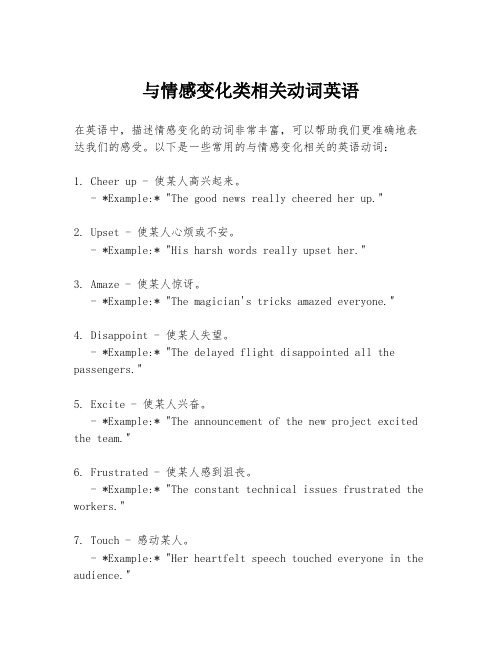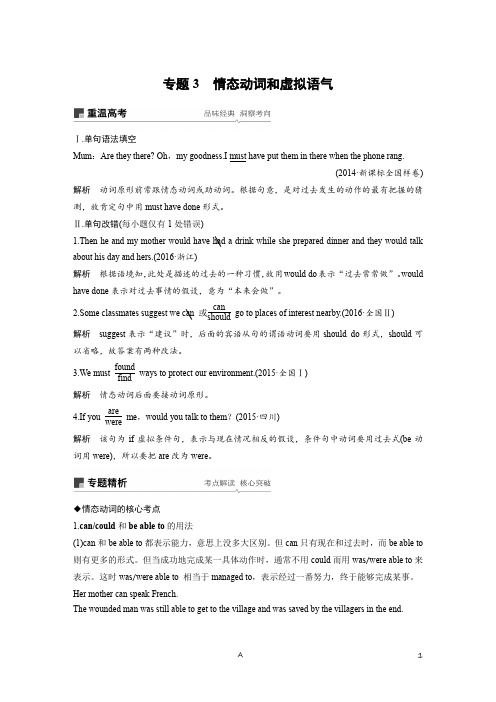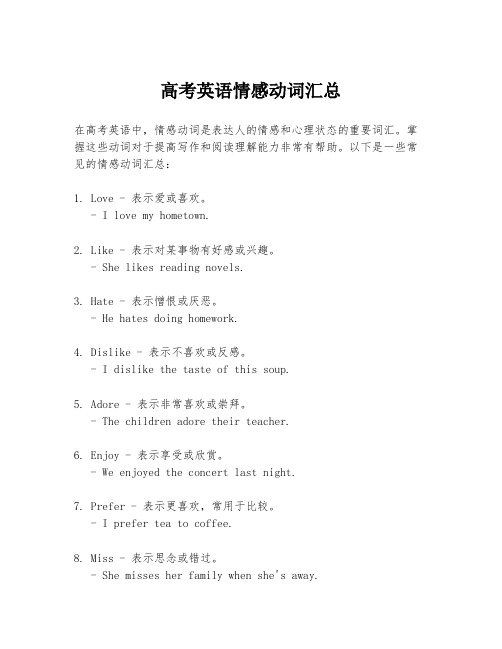高考英语情感类动词梳理(练习)
与情感变化类相关动词英语

与情感变化类相关动词英语在英语中,描述情感变化的动词非常丰富,可以帮助我们更准确地表达我们的感受。
以下是一些常用的与情感变化相关的英语动词:1. Cheer up - 使某人高兴起来。
- *Example:* "The good news really cheered her up."2. Upset - 使某人心烦或不安。
- *Example:* "His harsh words really upset her."3. Amaze - 使某人惊讶。
- *Example:* "The magician's tricks amazed everyone."4. Disappoint - 使某人失望。
- *Example:* "The delayed flight disappointed all the passengers."5. Excite - 使某人兴奋。
- *Example:* "The announcement of the new project excited the team."6. Frustrated - 使某人感到沮丧。
- *Example:* "The constant technical issues frustrated the workers."7. Touch - 感动某人。
- *Example:* "Her heartfelt speech touched everyone in the audience."8. Shock - 使某人震惊。
- *Example:* "The sudden news of his resignation shocked the company."9. Sadden - 使某人感到悲伤。
高考英语情感类动词归纳

1. amaze:使某人吃惊;amazing:令人惊叹的;amazed:感到惊奇的2. annoy:使某人恼怒; annoying:令人恼怒的;annoyed:感到恼怒的,生气的3. astonish:使某人惊愕;astonishing:令人惊愕的:astonished:感到惊愕的4. confuse:使某人困惑;confusing:令人困惑的;confused:感到困惑的5. convince:使某人信服;convincing:令人信服的;convinced:感到信服的6. delight:使某人高兴;delighting(delightful):令人高兴的;delighted:感到高兴的7. depress:使人低落;depressing:令人低落(沮丧)的;depressed:感到沮丧的8. disappoint: 使某人失望;disappointing:令人失望的;disappointed:感到失望的9. discourage:使某人泄气;discouraging:令人泄气的;discouraged:感到泄气的10. disgust:使人厌恶:disgusting:令人厌恶的;disgusted:感到厌恶(恶心)的11. embarrass:使人尴尬;embarrassing:令人尴尬的;embarrassed:感到尴尬的12. encourage:使有勇气;encouraging:令人鼓舞的;encouraged:感到鼓舞的13. excite:使人兴奋;exciting:令人兴奋的;excited:感到兴奋的14. exhaust: 使人筋疲力尽;exhausting:令人筋疲力尽的;exhausted:感到筋疲力尽的15. fright:使人惊恐;frightening:令人惊恐的;frightened:感到恐惧(害怕)的16. frustrate:使人沮丧;frustrating:令人沮丧的;frustrated:感到沮丧的17. inspire:使人鼓舞;inspiring:令人鼓舞的;inspired:感到鼓舞的18. interest:使人有兴趣;interesting:令人感兴趣的;interested:感到有兴趣的19. irritate:使人愤怒;irritating:令人愤怒的;irritated:感到愤怒的20. move:使人感动;moving:令人感动的;moved:感动的21. please:使人愉快;pleasing(pleasant)令人愉快的;pleased:感到快乐的22. puzzle:使人困惑;puzzling:让人困惑的;puzzled:感到困惑的23. satisfy:使人满意;satisfying(satisfactory):令人满意的;satisfied:感到满意的24. shock:使人震惊:shocking:令人震惊的;shocked:感到震惊的24. sicken:使人恶心;sickening:令人恶心的;sickened:感到恶心的26. surprise:使人惊讶;surprising:令人惊讶的;surprised:感到惊讶的27. terrify:使人害怕;terrifying:令人害怕的;terrified:感到害怕的28. tire:使人疲倦:tiring:令人疲倦的;tired:感到疲倦的29. touch:使人触动;touching;令人触动的;touched:感到触动的30. worry:使人担忧;worrying:令人担忧的;worried:感到担忧的。
高考词汇复习(人教版)---高中阶段所有情绪情感动词及相应考法

高考词汇复习(人教版)---中学阶段全部心情情感动词及相应考法-v+ed.(自己)感到···的心情情感v.-v+ing.令(别人)···的1.tire—tired—tiring—tiredness2.shock—shocked—shocking3.frighten—frightened—frightening4.amaze—amazed—amazing—amazement5.excite—excited—exciting—excitement6.exhaust—exhausted—exhausting—exhaustion7.terrify—terrified—terrifying8.satisfy—satisfied—satisfying—satisfaction9.interest—interested—interesting—interest10.amuse—amused—amusing—amusement11.depress—depressed—depressing—depression12.astonish—astonished—astonishing—astonishment13.bore—bored—boring14.embarrass—embarrassed—embarrassing—embarrassment15.relax—relaxed—relaxing—relaxation16.disappoint—disappointed—disappointing—disappointment17.annoy—annoyed—annoying—annoyance18.confuse—confused—confusing—confusion19.threaten—threatened—threatening20.surprise—surprised—surprising21.puzzle—puzzled---puzzling22.worry—worried--worrying高考考法练习1.The _________ (confuse) look on her face suggested that she hadn't quite understoodher manager's idea.2.They asked me so many ___ (confuse) questions that I got _______ (confuse)at last.3.The children were ___(tire)after the trip.4.The ___(tire)trip lasted a whole day.5.The trip made the children ___(tire).6.The bad weather made the trip ___(tire).7.Tom’s parents are ___(tire)at his ___(tire)results of the exams.8.___(disappoint)and angry, he left the meeting-room.9.It is ___(disappoint)that he didn’t pass the examination.10.When hearing the ___(surprise)news that Michael Jackson passed away,they were to look at each other.11.He was ___(worry)about his ___(worry)son.答案:1.confused2.confusing, confused3.tired4.tiring5.tired6.tiring7.tired, tiring8.disappointed9.disappointing10.surprising11.worried, worrying。
高考英语专题语法训练——情态动词和虚拟语气

专题3情态动词和虚拟语气Ⅰ.单句语法填空Mum:Are they there? Oh,my goodness.I must have put them in there when the phone rang.(2014·新课标全国样卷) 解析动词原形前常跟情态动词或助动词。
根据句意,是对过去发生的动作的最有把握的猜测,故肯定句中用must have done形式。
Ⅱ.单句改错(每小题仅有1处错误)1.Then he and my mother would have had a drink while she prepared dinner and they would talk about his day and hers.(2016·浙江)解析根据语境知,此处是描述的过去的一种习惯,故用would do表示“过去常常做”。
would have done表示对过去事情的假设,意为“本来会做”。
2.Some classmates suggest we can 或canshould go to places of interest nearby.(2016·全国Ⅱ)解析suggest表示“建议”时,后面的宾语从句的谓语动词要用should do形式,should可以省略,故答案有两种改法。
3.We must foundfind ways to protect our environment.(2015·全国Ⅰ)解析情态动词后面要接动词原形。
4.If youarewere me,would you talk to them?(2015·四川)解析该句为if虚拟条件句,表示与现在情况相反的假设,条件句中动词要用过去式(be动词用were),所以要把are改为were。
◆情态动词的核心考点1.can/could和be able to的用法(1)can和be able to都表示能力,意思上没多大区别。
高考英语情感动词汇总

高考英语情感动词汇总在高考英语中,情感动词是表达人的情感和心理状态的重要词汇。
掌握这些动词对于提高写作和阅读理解能力非常有帮助。
以下是一些常见的情感动词汇总:1. Love - 表示爱或喜欢。
- I love my hometown.2. Like - 表示对某事物有好感或兴趣。
- She likes reading novels.3. Hate - 表示憎恨或厌恶。
- He hates doing homework.4. Dislike - 表示不喜欢或反感。
- I dislike the taste of this soup.5. Adore - 表示非常喜欢或崇拜。
- The children adore their teacher.6. Enjoy - 表示享受或欣赏。
- We enjoyed the concert last night.7. Prefer - 表示更喜欢,常用于比较。
- I prefer tea to coffee.8. Miss - 表示思念或错过。
- She misses her family when she's away.9. Regret - 表示遗憾或后悔。
- He regretted not studying harder.10. Mind - 表示介意。
- Do you mind if I sit here?11. Forgive - 表示原谅。
- I hope you can forgive my mistake.12. Apologize - 表示道歉。
- I must apologize for being late.13. Blame - 表示责备。
- No one blamed her for the accident.14. Pity - 表示同情或怜悯。
- It's a pity that you can't come to the party.15. Worry - 表示担心或焦虑。
巧记情感类动词及用法

巧记情感类动词及用法情感类动词及用法:一、love(爱):love(v.):爱;喜欢。
例句:I love you so much.love(n.):爱;热爱;喜爱。
例句:I tried to express my love for him in words.二、like(喜欢):like(v.):喜欢;喜爱。
例句:I like him very much.like(n.):喜欢;乐于。
例句:It is not like him to be so rude.三、hate(憎恨):hate(v.):憎恨;厌恶。
例句:I hate that guy so much.hate(n.):憎恨;厌恶。
例句:His hate for his father was so strong.四、adore(崇拜):adore(v.):崇拜;热爱。
例句:She adored him so much.adore(n.):崇拜;热爱。
例句:The fans adore the singer.五、fancy(幻想):fancy(v.):想象;幻想。
例句:He often fancies himself as a hero.fancy(n.):想象;幻想。
例句:His fancy was running wild.六、admire(赞美):admire(v.):赞美;称赞。
例句:She admired him for his courage.admire(n.):赞美;称赞。
例句:His admirers flocked to him.七、cherish(珍爱):cherish(v.):珍爱;爱护。
例句:I will always cherish the happy memories.cherish(n.):珍爱;爱护。
例句:I can feel the love and cherishment from my parents.八、long for(渴望):long for(v.):渴望;思念。
情态动词Can、Could考点总结讲义 高三英语高考语法专题复习
高三英语高考语法专题复习情态动词概述与Can、Could考点总结与练习高三英语教研组整理热身练习(2024版):1.No one __________ be more warm-hearted; he has a heart of gold.2.—Did you visit the famous cultural relics last month?3.I think the work _________ be completed ahead of time.参考答案与解析:1.can/could考查情态动词。
句意:没有人能(比他)更热心,他拥有一颗金子般的心。
“can’t/couldn’t…+比较级”表示最高级含义。
No one本身表示否定,故应填can/could。
2.could have visited考查情态动词。
句意:——上个月你参观了那个著名的文物吗?——没有,我们本能够去,但是我们花太多时间购物。
结合句意可知,此处表示我们“本能够”去的,但是我们花太多时间购物,所以没能去。
could have done 本能够做某事(但没做成)。
故填could have visited。
3.can考查情态动词。
句意:我认为这项工作可以提前完成。
根据句意,此处表示客观上的可能性,应用情态动词can。
故填can。
考点讲解:概述情态动词(Modal Verbs)是用来表示能力、允许、预言、可能性、建议、情感、态度等的含义的一类动词。
我们使用缩写modal v.来表示情态动词。
情态动词属于不完全动词,因此情态动词不能独自在句中作谓语,即其后需要一个实义动词和情态动词共同在句中作谓语。
这样的谓语一般也称作“复合谓语”,属于复合谓语中的一种类型。
一般地,情态动词后面接不带to的动词不定式,即动词原形。
一般地,情态动词具有助动词的语法属性,可以完成一些语法功能的需要(比如可以构成否定句或疑问句等)。
有一些情态动词有相应的过去式的形式,有一些则没有(如must 等)。
高考英语口语中的情感动词
高考英语口语中的情感动词高考英语口语中必备的情感动词1.Amazie:让某人大吃一惊;惊艳:惊艳;惊讶:惊讶。
2.惹恼:惹恼某人;烦人的:令人恼火的;生气,生气。
使某人吃惊;震惊:震惊:惊讶:惊讶。
4.迷惑:迷惑某人;迷惑的:迷惑的;困惑:困惑5.说服:说服某人;令人信服的:令人信服的;“确信:确信”6.快乐:让某人快乐;令人愉快的;欣喜:我觉得开心。
7.抑郁:使人抑郁;压抑的:压抑的(压抑的);沮丧:沮丧8.失望使某人失望;令人失望:令人失望;失望:失望9.劝阻:劝阻某人;发现:令人沮丧;发现:感到气馁10.厌恶:恶心:恶心:恶心;厌恶:感到厌恶(恶心)11.尴尬:令人尴尬;困境:尴尬;尴尬:尴尬。
12.鼓励:使人有勇气;编码:鼓励;编码:鼓励。
13.兴奋:使人兴奋;激动人心的:激动人心的;激动:激动。
14.耗尽:使人筋疲力尽;耗尽:耗尽;筋疲力尽:感到筋疲力尽15.惊吓:使人恐慌;令人恐惧的;害怕:感到害怕(害怕)16.沮丧的:令人沮丧的;令人沮丧的:令人沮丧的;沮丧:沮丧17.激励:鼓舞人心;鼓舞人心的:鼓舞人心的;启发:鼓励。
18.兴趣:让人感兴趣;有趣:有趣;感兴趣:感兴趣。
19.激怒:使人生气;刺激性的:刺激性的;恼怒的:生气的。
20.感动:感动人;移动:移动;感动:感动。
21.请:让人快乐;令人愉快的;高兴:感到高兴22.困惑:令人困惑;莫名其妙的:令人困惑的;困惑:困惑23.满足:使人满意;满意的;满意的。
满意:满意。
24.震惊:震惊:震惊:震惊;震惊:震惊24.生病:使人生病;恶心的:令人作呕的;恶心:我觉得恶心。
26.惊喜:给人惊喜;惊人的:惊人的;惊讶:惊讶27.恐吓:使人害怕;可怕的:令人恐惧的;害怕:害怕。
28.累:累人:累人:累人;累:累。
29.触摸:触摸人;感人;感人;感动:感动。
30.烦恼:使人烦恼;担忧:担忧;担心:担心。
英语情感类动词考查
英语情感类动词考查在英语学习中,情感类动词是表达个人情感和态度的重要词汇。
以下是一些常见的情感类动词,以及它们在句子中的应用:1. Love - 表示喜爱或爱慕。
- I love listening to music.2. Hate - 表示憎恨或厌恶。
- She hates doing homework.3. Like - 表示喜欢或倾向。
- I like to read books in my spare time.4. Dislike - 表示不喜欢或反感。
- He dislikes the taste of coffee.5. Enjoy - 表示享受或欣赏。
- We really enjoyed the concert last night.6. Miss - 表示思念或错过。
- I miss my family when I'm away from home.7. Prefer - 表示更喜欢或倾向于选择。
- I prefer tea over coffee.8. Admire - 表示钦佩或赞赏。
- She admires his dedication to the project.9. Detest - 表示强烈厌恶。
- He detests dishonesty.10. Affect - 表示影响或感动。
- The movie deeply affected the audience.11. Amuse - 表示娱乐或逗乐。
- The clown amused the children at the party.12. Annoy - 表示使烦恼或生气。
- The constant noise annoys me.13. Disturb - 表示打扰或使不安。
- I don't want to disturb you while you're working.14. Touch - 表示感动或触碰。
高中英语高考复习情感类读后续写素材积累练习(基础+多译)
高考英语情感类读后续写素材积累练习班级考号姓名总分一、基础练习1. 悲愁【根据英语写出汉语意思】①表情变得严肃②某人看起来有点因惑③某人的脸窘得通红④某人的脸吓得都白了⑤某人愁眉不展的样子⑥某人因为羞愧而感到脸颊发烧⑦某人泪流满面⑧某人涨红了脸⑨一滴泪顺着某人的脸颊滑落下来【根据汉语提示默写英语短语】(1)one’s face grow serious(2)one’s face looked a little confused(3)one’s face flushed/burned with embarrassment(4)one’s face paled with fright(5)had a slight frown on one’s face(6)one’s cheeks burning with shame(7)one’s ch eeks are wet with tears(8)color rushed/flooded to one’s cheeks(9)a tear slid down one’s cheek①忍住眼泪②无声地流泪③无声哭泣④呜咽、抽泣⑤突然大哭⑥嚎啕大哭⑦泪流满面⑧眼有泪光⑨热泪盈眶⑩撒下喜悦的泪水【根据汉语提示默写英语短语】(1)fight/hold/keep back tears(2)Weep(3)cry in silence(4)sob(5)burst into tears(6)squall(7)tears streamed down one’s face/cheeks(8)with tears glistening in one’s eyes(9)with tears welling up in one’s eyes(10) shedding tears of joy①心情愉快②振作精神③心情好④几乎无法掩饰兴奋⑤既兴奋又开心⑥对......很高兴⑦对......感到非常高兴⑧因......而高兴⑨欣喜若狂⑩使某人心情愉快11让某人开心的是12眉开眼笑【根据汉语提示默写英语短语】(1)in high spirits(2)keep up one’s spirits(3)in a good mood(4)can hardly conceal excitement(5)a mixture of excitement and happiness(6)be delighted at(7)be overjoyed at(8)be joyful over/about(9)be wild with joy(10) brighten one’s heart(11) to one’s delight(12) one’s smile light up4.笑【根据英语写出汉语意思】①面带微笑/露出笑脸②灿烂的笑容③笑容满面④笑,发笑⑤开怀大笑⑥嘲笑某人⑦咧嘴笑⑧眉开眼笑⑨咯咯地笑⑩轻轻地笑11疯狂大笑12(一群人)狂笑【根据汉语提示默写英语短语】(1)wear/ crack a smile(2)bright smile(3)be all smiles(4)laugh(5)burst into laughter/ burst out laughing(6)laugh at someone(7)grin from ear to ear(8)beam(9)giggle(10)chuckle(11)roar with laughter(12)howl with laughter二、一句多译练习一、一听到他妈妈去世的消息,她非常悲伤。
- 1、下载文档前请自行甄别文档内容的完整性,平台不提供额外的编辑、内容补充、找答案等附加服务。
- 2、"仅部分预览"的文档,不可在线预览部分如存在完整性等问题,可反馈申请退款(可完整预览的文档不适用该条件!)。
- 3、如文档侵犯您的权益,请联系客服反馈,我们会尽快为您处理(人工客服工作时间:9:00-18:30)。
高考英语词汇突破之常用情感类动词
(云卷云舒依据新课程标准梳理)
Ⅰ.词汇集锦:
1. ____________使惊恐______________adj. 令人恐惧的______________adj.担忧的,恐惧的
2. ______________使某人吃惊; ______________adj. 令人惊叹的; ______________adj.感到惊奇的
3. ______________使某人恼怒; _________________________;___________________________
4. ______________使某人惊愕; _________________________;___________________________
5.______________ vt.使厌烦,使厌倦_________________________;___________________________
6. ______________使某人困惑; _________________________;___________________________
7. ______________使某人信服; _________________________;___________________________
8. ______________使某人高兴; _________________________;___________________________
9. ______________使人低落; _________________________;___________________________
10. ______________使某人失望; _________________________;___________________________
11. ______________使某人泄气; _________________________;___________________________
12. ______________.使心神不安_________________________;___________________________
13. ______________使人尴尬; _________________________;___________________________
14. ______________使有勇气; _________________________;___________________________
15. ______________使人兴奋; _________________________;___________________________
16. ______________使人筋疲力尽; _________________________;___________________________
17. ______________使人惊恐; _________________________;___________________________
18. ______________使人沮丧; _________________________;___________________________
19. ______________使人鼓舞; _________________________;___________________________
20. ______________使人有兴趣; _________________________;___________________________
21. ______________使人感动; _________________________;___________________________
22. ______________使人愉快; _________________________;___________________________
23. ______________使人困惑; _________________________;___________________________
24. ______________使人满意; _________________________;___________________________
25. ______________使害怕,使恐惧_________________________;___________________________
26. ______________使人震惊; _________________________;___________________________
27. ______________使人惊讶; _________________________;___________________________
28. ______________使人害怕; _________________________;___________________________
29. ______________使激动,使毛骨悚然___________________;_________________________
30. ______________使人疲倦; _________________________;___________________________
31._______________使人触动; _________________________;___________________________
32.______________使生气,使心烦意乱______________________;________________________
33.______________使人担忧; _________________________;__________________________
34. _____________ vt. 使振奋,使高兴 cheerful adj. ____________________________
35. ______________使紧张________________ adj. 焦虑的stressful adj. __________________
36.__________________ vt. 威胁,恐吓________________________ adj. 带有威胁的
37.___________________ vt.使着迷,使迷住____________________ adj.迷人的,极有吸引力
__________________________adj. 被迷住的,极感兴趣的
Ⅱ.学以致用:
1.______________(convince) that he can make a difference, Tony decided to stop and gave them a hand.
2.Dave's friend Sam saw that he was____________(upset) when they met one evening, and said, “What's
up, Dave?”
3.He loved his job so much that every time he went out on a story, he _____________
(delight).
4.Watching movies to learn English is ____________________(frustrate) because the people speak too
quickly.
5.Most doctors and nurses work under ________________ (stress) conditions.
6.Father looked ____________(disappoint). He looked______________ (disappoint) at my report.
7.The ___________________(amaze) fact is that because of higher prices and better technology, we
keep finding more oil that we can extract(开采).
8.At the sight of the____________ scene, all the people present ____________ (move) to tears.
9.Having a disability doesn’t mean your life is not ________________(satisfy).
10.What ___________(puzzle) me most is that I failed in the English examination however hard I worked.。
